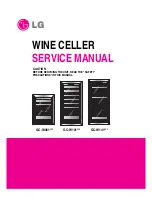
7
E
EN
NE
ER
RG
GY
Y S
SA
AV
VIIN
NG
G T
TIIP
PS
S
•Reduce door openings.
•Close the door as soon as you can.
•Keep the coils on bottom of the wine cellar clean.
•Adjust the temperature control to a warmer setting when practical.
•Install unit away from the stove or other heat sources.
LOADING TIPS AND SUGGESTIONS
Each of the six racks hold four bottles. The necks of the bottles alternate front to back. To aid in loading/unloading,
the racks pull forward to allow easier access to the rear bottles. Bottom racks may be removed for storing “jug’” wines.
Magnums and other large bottles may be stored by removing the rack directly above the intended storage rack. To
remove the racks, lift up slightly and slide out.
Bottles on the top rack directly under the light will be exposed to slightly higher temperature when the light is on.
Store red wines on the upper racks where the temperature is higher and white wines on the middle or lower racks
where the temperature is lower. REMEMBER TO TURN OFF THE LIGHT WHEN IT IS NO LONGER NEEDED.
Store wines intended for everyday use on the front half of the racks where labels are completely visible and place wines
for aging or long term storage in the rear half of the rack.
TROUBLESHOOTING CHART
P
Prro
ob
blle
em
m
P
Po
ossssiib
blle
e C
Caau
usse
e//S
So
ollu
uttiio
on
n
Odor in cabinet
Interior needs cleaning.
Noisy operation/cabinet vibrates
Cabinet not level; weak floor.
Cabinet light not working
Bulb burned out; no power at outlet.
Appliance will not run
Temperature control to “OFF”; line cord not plugged in; no power at
electrical outlet; house fuse blown.
Appliance runs too long
Prolonged door openings; control set too cold; condenser needs
cleaning
Moisture collects inside
Too many door openings; prolonged door openings; (hot, humid
weather increases condensation)
Moisture collects to outside surface
(Hot, humid weather increases condensation); control improperly set.
Interior too hot/too cold
Control improperly set; faulty thermometer; (relocate thermometer to
center of cabinet and recheck)




























